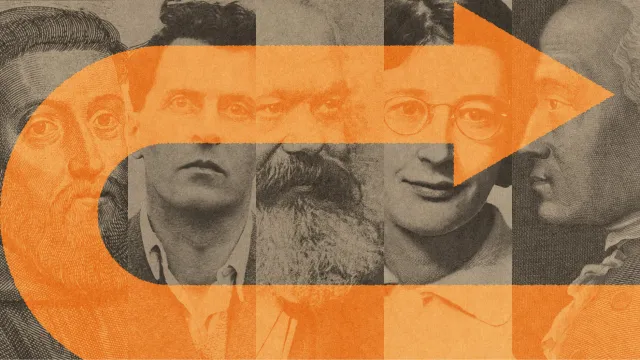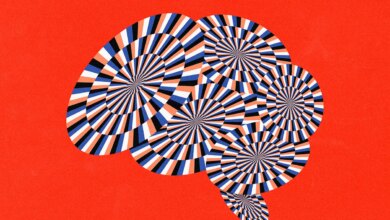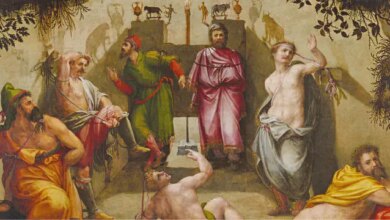
5 great thinkers who rejected their own ideas
By Shai Tubali | Published: 2025-09-30 15:25:00 | Source: Thinking – Big Think
Sign up for Big Think on Substack
The most surprising and impactful new stories delivered to your inbox every week, for free.
Here’s a curious fact that often slips by unnoticed: Philosophers rarely change their minds. Across the history of the discipline, you could count on two hands those who openly revised their positions on major questions.
This is surprising, given philosophy’s very nature. It thrives on debate, supplying endless reasons to question one’s stance. Philosopher Will Buckingham once remarked that, if reasoned dialogue worked as we might expect, philosophers would be shifting their views “with a quicksilver frequency that would put the rest of us to shame.” After all, in a world teeming with critical colleagues and formidable counterarguments, one might imagine minds constantly turning over. The ideal philosopher, we assume, would be supple, guided by evidence, and willing to follow arguments wherever they lead — embodying the Socratic lesson that recognizing one’s fallibility is the beginning of wisdom. As Alexandra Plakias has noted, philosophical about-faces should not scandalize us; they should be honored.
Hilary Putnam, one of the 20th century’s most influential philosophers, stood out as a rare figure who treated changing his mind as a virtue rather than a failing. He even defended it openly, presenting self-revision as a mark of intellectual honesty. In 1988, in the introduction to his major work Representation and Reality, he performed one of his most striking turnarounds: renouncing functionalism, the computational model of mind he had once advanced. Anticipating disapproval, he asked why colleagues treated this habit as a flaw. Perhaps, Putnam quipped, he erred more often — while “other philosophers don’t change their minds because they simply never make mistakes.” For him, obstinacy was far worse than correction.
So, why does intellectual stubbornness so often carry the day? Buckingham suggests it begins with the sheer effort that philosophers pour into their arguments. To see that carefully constructed edifice topple like a house of cards is painful enough — even worse when a lifetime’s reputation is bound up with it. Safer, then, to keep loosing arrows at others’ positions rather than one’s own. Yet the culture of philosophy adds to the pressure. Sticking faithfully to a theory is praised as strength, a badge of consistency. In an age enthralled by certainty and being right, reversal is branded weakness. Little wonder that a philosopher who changes course invites surprise, suspicion, and sometimes the hostility of old friends.
Still, the history of ideas contains flashes of intellectual heroism: the nerve to renounce even one’s most celebrated beliefs in deference to truth. Psychologist Peter C. Hill observes that while many dismiss such reversals as flip-flopping, the simple act of saying “I was wrong” can signal resilience, modesty, and openness. In a discipline built on unrelenting argument and daring questions, the ability to shift course in light of stronger reasoning is not weakness but a philosopher’s deepest obligation. Such episodes remind us that philosophy, at its best, thrives on receptivity and the humility to change direction.
Even in antiquity, some thinkers embodied this courage. Timocrates of Lampsacus broke with his mentor Epicurus, denouncing the very school he had once embraced. His brother Metrodorus struck back with a fiery polemic, Against Timocrates. Dionysius of Heraclea, caught in a health crisis, abandoned Stoicism for the pleasures of the Cyrenaics — only to be branded a traitor by former allies who saw his change of heart as proof of weakness.
From these early renegades, we now turn to five later cases of “radical reversal”: Augustine, Kant, Marx, Wittgenstein, and Simone Weil. These were no youthful missteps corrected with time, but towering thinkers at the height of their powers overturning their own hard-won systems. Each held fast to a worldview until a crisis or revelation broke it apart. Instead of clinging tighter, they leapt into new terrain — often at steep personal cost.
St. Augustine: From cosmic puppets to the grip of grace
Augustine of Hippo (354–430) altered his philosophical course twice — and each time with seismic force. Long before he was canonized as a saint, he was a restless, brilliant young mind absorbed in a very different creed. For nine years, he devoted himself to Manichaeism, a Persian religion now vanished from history. Its vision was stark: the Universe locked in perpetual war between Light and Darkness, good and evil. In this scheme, free will was feeble, and sin could be blamed on dark forces inhabiting the body. Augustine rose quickly, dazzling as a public advocate, trading arguments with Christians and skeptics alike. Yet his private life told another story: “in love with love,” he clung to pleasure, kept a concubine, fathered a son — and reasoned it all away as the work of Darkness.
In his late twenties, Augustine entered a season of turmoil. Doubts about Manichaean cosmology grew sharper, and he slowly drew back from the dualists. For three unsettled years, he searched for a philosophy that could steady his restless mind — testing skepticism, exploring Neoplatonism, and weighing Christian teachings, already entertaining the notion of free will. Outwardly, he taught rhetoric; inwardly, he wrestled. He had parted from his mistress, reluctantly accepted an arranged marriage, and spent months in semi-monastic retreat with friends.
Then came the turning point. Weeping helplessly beneath a fig tree, he heard a child’s voice chanting, “Take up and read.” Opening the New Testament at random, he was seized by a sudden clarity: a light of serenity that dissolved doubt and gave him strength to renounce his old life.
In the summer of 386, Augustine embraced Christianity with dramatic finality, abandoning his career as an imperial rhetoric teacher and a never-realized arranged marriage. Yet this was not the last reversal. The great struggle of his thought — the tension between free will and grace — would occupy him for the rest of his life. Early in his Christian journey, eager to refute Manichaean fatalism, he championed human freedom. In On Free Choice of the Will, he argued that evil arises from the misuse of choice, not from some rival deity, and that responsibility lies with us. Sin, he insisted, cannot be laid at the feet of cosmic powers.
But over time, Augustine’s position shifted radically, driven by new opponents. The British monk Pelagius taught that humans could reach salvation unaided, by sheer moral effort. Alarmed, Augustine hardened his doctrine of grace, becoming its great theorist. By the end of his life, he insisted that without God’s unearned gift, humans are powerless to do good; even the first steps of faith depend on grace. His prayer — “Give what you command, and command what you will” — captures this conviction. Critics accused him of veering back toward Manichaean determinism. Augustine countered with nuance: free will exists, but is helpless without grace. His revisions shaped centuries of debate.
Kant: From rationalist dreams to critical awakening
Few intellectual shifts have reshaped Western thought as profoundly as Immanuel Kant’s break with the rationalist metaphysics of his youth. His career divides neatly in two: the pre-critical years, ending in 1770, and the critical period, beginning in 1781 with the Critiques that would redirect philosophy itself. Who would have expected that this measured, provincial professor — methodically rehearsing inherited dogmas — would one day upend them? In his early work, Kant embraced German rationalism, convinced that pure reason could prove God’s existence and the soul’s immortality. Yet beneath his confidence stirred unease: How much could reason truly claim as certain?
Kant’s breakthrough began as an intellectual and existential crisis. Immersed in the writings of the Scottish skeptic David Hume in the 1760s, he felt as though Hume had broken into his “dogmatic slumber,” shattering his faith in the unchecked power of pure reason. Hume’s piercing doubts about metaphysics forced Kant to see that he had been accepting, without question, comfortable assumptions — that reason could grasp causation, the cosmos, even God’s nature. Hume made him face the possibility that much of metaphysics was, in his phrase, “sophistry and illusion.”
The shock was profound. In midlife, Kant resolved to start again. He withdrew from publishing for over a decade — his so-called “silent period” — to rebuild philosophy from the ground up. Friends noticed he stopped frequenting social clubs, absorbed instead in solitary reflection. He later joked that the effort cost him his health, though he lived on, remarkably, to the age of 80.
In 1781, Kant stepped back onto the stage with the Critique of Pure Reason, a book he likened to a “Copernican revolution” in philosophy: shifting the center of knowledge from the world to the mind that knows it. No longer was the mind a passive mirror of reality. Instead, reality always appeared through the architecture of our perception. Space and time were not floating entities but the lenses through which anything can be seen at all. Cause and effect were not properties of objects but the laws our understanding uses to link events. From this radical view, we never grasp “things-in-themselves,” reality as it exists apart from us, but we can know appearances with certainty, since they are shaped in consistent ways by our faculties.
This was the birth of his “critical philosophy.” Questions the younger Kant had answered glibly were now declared insoluble. He had changed his mind about the mind itself — recognizing that truth required admitting where reason must stop. The Critique is dense, often desperate, as Kant tried to salvage what was vital in metaphysics while exposing its illusions. The book was met coolly; colleagues clung to the old certainties he dismantled. Yet Kant pressed on. With his later Critiques, he secured his overhaul. Modern philosophy begins here, at the boundary of what reason can know.
Marx: From romantic fire to the machinery of revolution
Karl Marx’s thought (1818–1883) turned with the force of a revolution, from youthful idealism to hard materialism — a shift so stark that scholars later spoke of a “young” and a “mature” Marx. In the 1840s, the young Marx, nourished by Enlightenment humanism and German Idealism, wrote with urgency about human “alienation” and the dream of fulfillment in a freer world. He pictured communism as the recovery of our “species-being,” where the human essence could finally blossom, unshackled from capitalist estrangement. Humanity stood at the heart of his vision. A fiery revolutionary in spirit, he still trusted reasoned critique to spark transformation.
Within a few short years, Marx underwent a profound conversion. Two shocks set it in motion. The first came through journalism, where he confronted the raw edges of social life: censorship, peasant misery, unjust laws. One case seared him — poor villagers punished for collecting fallen wood in aristocrats’ forests. What the wealthy dismissed as theft was, for the poor, survival. Encounters like these pulled him from “pure politics” toward economics and socialism. Abstract philosophy, he realized, could not explain or mend such wounds; he must plunge deeper into reality. With some irony, he would later recall in an 1859 preface that journalism had landed him “in the embarrassing position of having to discuss what is known as material interests.”
The second shock was intellectual: socialist and materialist ideas pouring in from contemporaries like Ludwig Feuerbach and, above all, Friedrich Engels. Engels persuaded the skeptical Marx that the working class was history’s true engine. By 1845, Marx was scorning his colleagues for floating in the clouds. At the same time, he was redefining human beings as products of social and class conditions rather than carriers of a timeless essence. In The German Ideology, he and Engels wrote that they had to “settle accounts with our former philosophical conscience,” leaving behind speculative habits. The break was so decisive that he never published his early manuscripts, judging them naïve.
The mature Marx changed his mind about how to change the world. That turn laid the foundation for Capital. The young Marx, still speaking the language of humanist ideals, gave way to the older Marx, who dissected capitalism with the scalpel of science. History, he now argued, advanced through material forces and class conflict, not lofty visions. Capitalism would not crumble before appeals to conscience; it would collapse only under the weight of its own contradictions, giving way to revolution when conditions ripened. Where the youthful Marx sketched utopias, the mature Marx turned to economics and praxis.
The cost of this shift was immense. Colleagues accused him of betraying philosophy; the Prussian state drove him into exile. He paid with career, homeland, comfort, enduring poverty, illness, and loss. Yet he stood firm, remembered for saying that “to leave error unrefuted is to encourage intellectual immorality.”
Wittgenstein: From logical perfection to living language
Ludwig Wittgenstein is the poster boy of philosophical shifts. In 1921, he published the Tractatus Logico-Philosophicus, a dense treatise declaring that the world is made of facts mirrored in logical propositions, and whatever cannot be so expressed must be met with silence. Its final line — “Whereof one cannot speak, thereof one must be silent” — sealed its austere vision. Convinced he had solved every riddle, Wittgenstein quit philosophy, calling his work “unassailable and definitive.” Then came the drama: He gave away his fortune, abandoned Cambridge for a village schoolhouse, and wrestled with guilt and depression, living in a fever of intellectual aimlessness.
Doubts soon began to gnaw at Wittgenstein’s certainty. The first crack came in 1923, when the young mathematician Frank Ramsey pointed out that the Tractatus couldn’t explain something as simple as why “a point in the visual field cannot be both red and blue.” The contradiction didn’t arise from logic, Ramsey argued, but from the texture of reality itself. Wittgenstein tried to patch the flaw, only to see the critique cut straight to the heart of his theory. The strain of rethinking left him at times feeling close to madness.
A few years later came the decisive blow: his conversations with Italian economist Piero Sraffa. In one famous moment, Sraffa brushed his chin in a Neapolitan “I don’t care” gesture and asked, “What logical form does that have?” Wittgenstein was floored. He later compared Sraffa’s influence to mining a stubborn ore vein — backbreaking work, yet rich with transformative discoveries.
After nearly nine “lost years,” Wittgenstein returned to Cambridge determined to confront what he called his own “grave mistakes.” The result was his second masterpiece, Philosophical Investigations, published after his death in 1953 — a book that flatly contradicted the Tractatus. Philosopher Lee Braver described the shift as “as radical as the move from modern to post-modern philosophy.” Gone was the dream that language could map the structure of reality. Instead, Wittgenstein came to see language as a mirror of us — woven into our practices, our habits, our forms of life. Meaning was no longer fixed by logic but by use, like Sraffa’s tossed-off chin-brush that baffled him.
The attempt to build a perfect logical language, he now warned, lures philosophers into illusions; the Tractatus itself was guilty of that folly. He even likened it to a faulty clock — impressive in design, useless in function.
That act of intellectual self-destruction bewildered some, yet over time it gave Wittgenstein a prophetic aura: the rare thinker who dared to scrap his own masterpiece in search of truth.
Simone Weil: From world revolution to soul revelation
Simone Weil may be the clearest portrait of a thinker who kept abandoning certainties in pursuit of higher truth. Born in 1909, she seemed to thrive on extremes: brilliant scholar, factory hand, political agitator, soldier, and finally a mystic flirting with sainthood. Her first identity was as a Marxist radical. Refusing the comforts of academia, she threw herself into workers’ lives, earning the nickname “The Red Virgin.” She gave away her income, joined protests, and labored incognito in factories — an ordeal that nearly destroyed her health. Her early essays, written through a Marxian lens, proclaimed revolutionary socialism as justice’s true path.
Yet Weil would not surrender her conscience to any creed. By the late 1930s, she was already revisiting her Marxian commitments, prying at their weak joints. What disturbed her most was Marx’s faith in history’s “laws,” the promise that the proletariat’s victory was inevitable. To her, this smelled of dogma no less than the Church’s certainties. Reality, she insisted, was tangled, tragic, never on a track to utopia. She also saw in communist movements the seeds of tyranny, where liberators might become new masters. Thus, she drifted into heresy on the left, holding truth above every party banner.
Then, the deeper upheaval: mysticism. In 1938, during Holy Week at the Benedictine monastery of Solesmes, Gregorian chant pierced her like light through armor, filling her with a joy so pure it seemed divine. Later, hearing George Herbert’s Love (III), she wrote, she felt “Christ himself came down and took possession of me.”
This was her point of no return: The ardent materialist and champion of the oppressed had fallen in love with God — specifically, the God on the Cross. Weil’s thought took on a new radiance, shaped by Christian-Platonist mysticism, though she never formally converted. She wrote of “decreation,” the undoing of self so that divine love might flow through. Her compassion became so uncompromising that it reached even enemies, and she treated affliction not as meaningless pain but as a doorway into God’s presence. The political revolution she once craved now seemed too small; what was needed was a revolution in the soul, wrought by grace.
In wartime exile, she wove her two great loves — justice and God — into one vocation. She volunteered for perilous missions, filled her notebooks with blazing insight, and restricted her food to the rations of those under occupation. The discipline consumed her; she died in 1943 at just 34. Even then, each reversal in her short life was, for her, an ascent — driven by an unyielding hunger for absolute truth and goodness, crowned at last in God.
Why great minds change their own
Philosophy often glorifies the builders of grand systems — the bold architects of thought who draw sweeping maps of reality. Yet no less worthy are the moments of self-correction, when a thinker dares to undo what once seemed certain. Conviction is not stubbornness. The greater strength lies in saying: “I have learned something that overturns my earlier belief, and I choose truth over pride.” Such reversals do not diminish a philosopher; they make them greater. We remember Wittgenstein not only for the Tractatus or the Investigations, but for the story of a mind unafraid to dismantle its own certainties.
These examples remind us that true critical thinking begins at home. To interrogate our own assumptions, to stay open when experience, dialogue, or suffering presses against us — that is philosophy at its deepest. Thought is not a finished edifice; it is a living journey. The greatest minds advanced by transcending themselves, sometimes carrying within them the drama of two philosophers at war.
In our polarized age, where doubt is mocked as weakness, their lesson is urgent. Can we welcome change in our own thinking — even delight in it? To do so is to join philosophy’s oldest vow: a fearless love of truth.
Sign up for Big Think on Substack
The most surprising and impactful new stories delivered to your inbox every week, for free.
ــــــــــــــــــــــــــــــــــــــــــــــــــــــــــــــــــــــــــــــــــــــــــــــــــــــــــــــــ






